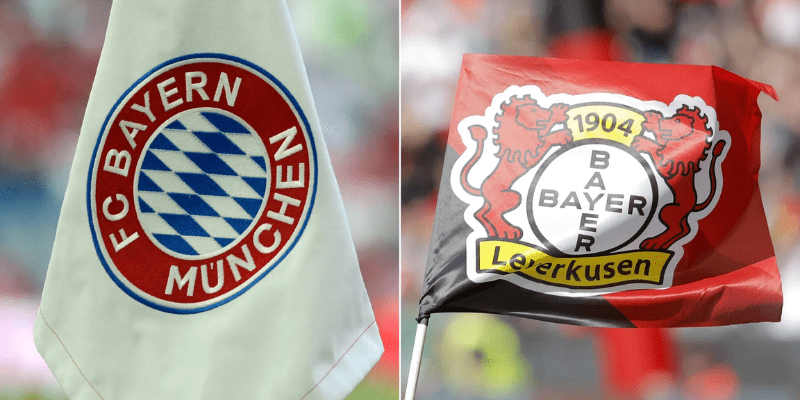In the world of German football, the question “are Bayern Munich and Leverkusen rivals?” comes up a lot—and the answer is: yes, but with important nuances. FreeKickSEO will walk you through the story, the facts, and what makes this matchup increasingly tense and relevant.
What defines a rivalry in football

To understand if two clubs are rivals, we usually look at:
- Competitive history: how often they fight for titles or high places.
- Head-to-head record: balance of wins, draws, losses.
- Fan sentiment and expectations: emotional stakes, local pride, narratives.
- Recent developments: especially when one club is challenging the dominant one.
With that in mind, let’s see how Bayern Munich vs Bayer Leverkusen stacks up.
Historical context between Bayern Munich & Leverkusen
Early years and “Neverkusen” label
Leverkusen has often been portrayed not just as a challenger but sometimes as a tragic figure in German football history. Known as “Neverkusen,” they had a stretch of seasons (especially late 1990s to early 2000s) with multiple second-place finishes but rarely clinched the top spot. That nickname reflected both affection and frustration among fans.
They came close in key instances:
- In 2000, needing only a draw in one of the final games, a loss plus Bayern’s win elsewhere denied them the title. edia)
- In 2002, despite leading late in the season, they slipped in a way that allowed others to overtake them. That year also saw huge disappointment in the Champions League final and in national cup final.
These moments built up a kind of emotional background: Bayern as the established power, Leverkusen as close-but-not-quite, often heartbreak. That contributes to rivalry feelings from Leverkusen’s side and their supporters.
Recent seasons: Challengers rising
Leverkusen’s status has shifted in the last few years:
- In the 2023–24 season, Leverkusen won their first ever Bundesliga title, ending Bayern Munich’s long stretch of dominance. They went through much of the season unbeaten.
- They also won the DFB-Pokal that season, completing a domestic double. Wikipedia)
- Their performance against Bayern in recent head-to-head matches has been more competitive, reflecting their growth.
So, Leverkusen has emerged.
Head-to-head and statistical snapshot

Here are some of the key stats showing how the two teams compare:
- Historically, Bayern have had the up, one head-to-head record shows Bayern with about 62 wins, Leverkusen 22, and some draws, out of just over 100 games.
- In all competitions, Leverkusen have managed some memorable wins and draws, but Bayern still record more dominant victories in many cases.
- In more recent matches, Leverkusen are more frequently challenging Bayern: draws, occasional wins, strong performances at BayArena and elsewhere.
So, from the numbers: Bayern leads, but the gap is narrowing in competitiveness and frequency of “important” matches.
Do fans see them as rivals?
A rivalry isn’t just about stats—emotions, narratives, and perceptions matter a lot.
- Leverkusen fans have long seen Bayern as the benchmark to beat, the team they want to knock off the pedestal. For them, Bayern represent the standard of success.
- Some media narratives treat Bayern vs Leverkusen as a rivalry that’s heating up—especially when Leverkusen are title challengers. There’s talk about “modern rivalry” when both clubs are fighting for the Bundesliga crown, rather than Bayern steamrolling.
- On Bayern’s side, Leverkusen are often seen as a lesser threat compared to Bayern’s more traditional rivals (e.g. Borussia Dortmund), but there is growing respect, especially given Leverkusen’s recent achievements.
So yes, there is rivalry sentiment—much stronger now than maybe in past decades when Leverkusen were outsiders and Bayern were almost guaranteed title winners.
Why Bayern vs Leverkusen feels more like a rivalry today
Several elements have come together to elevate this fixture from just another “big game” to something more:
- Title races: When Leverkusen are genuinely in the hunt, matches against Bayern become direct battles, pressure-filled. Winning or dropping points in these matches has big consequences.
- Managerial stories: With good leadership, consistent strategy, Leverkusen have closed the quality gap. Rising under Xabi Alonso (and others), their tactical acumen and squad improvements have made matches more competitive.
- Psychological weight: Past disasters (“Neverkusen” moments) linger—every title opportunity, every slip-up gains more attention. Leverkusen’s recent success lifts that burden, but also raises the sense that they are no longer just the underdog.
When Bayern vs Leverkusen meet now, there is tension, expectation, and narrative: “Can Leverkusen take the crown?” “Will Bayern reassert dominance?” Those are the ingredients of a rivalry.
Comparison with other German rivalries

To see how this stacks up, it’s helpful to compare with more established rivalries in Germany.
- Bayern vs Borussia Dortmund is arguably the biggest modern rivalry: huge fanbases, many big matches (including Champions League), often direct title/European qualification contests.
- Clubs like Schalke vs Dortmund, Hamburg vs Bremen, Cologne vs Gladbach have local/regional rivalries steeped in geography and history.
Bayern vs Leverkusen doesn’t have (yet) the same level of cultural or fanbase antagonism, nor the historical bitterness of some derbies. But what it does have is increasing competitiveness, high stakes, and changing dynamics that move it toward being seen as a “major rivalry” in the Bundesliga.
So: Are Bayern Munich and Leverkusen rivals?
Putting together history, stats, fan feeling, and recent developments, the answer is a qualified yes: Bayern Munich and Leverkusen are rivals, particularly in the modern era.
- For Leverkusen, Bayern represent what they’ve long strived to defeat: titles, legacy, prestige.
- Bayern see Leverkusen increasingly as serious competition—not just for league finishes but for trophies.
- While it’s not yet on the same level as some rivalries born over decades of social, geographic, or political conflict, the rivalry is real, growing, and fueled by recent successes.
Key moments in the Bayern vs Leverkusen rivalry
Here are some of the flashpoints that illustrate how the rivalry has intensified:
- Leverkusen’s first Bundesliga championship in 2023-24, breaking Bayern’s almost decade-long dominance.
- Matches in recent seasons where Leverkusen have beaten Bayern, drawn crucial games, or forced Bayern to fight hard—these lift the emotional stakes of each meeting.
- Instances in cups and knock-out games; Leverkusen taking points or winning in high-pressure settings. These matches tend to be remembered harder by fans.
Risks & caveats: what prevents it from being a “classic” rivalry
Some factors still limit how “deep” or broad the rivalry is:
- Lack of shared history in terms of geographic proximity: Leverkusen is not a local derby for Bayern; the regional tension is smaller.
- Bayern’s consistent success over many years still means imbalance: in trophies, resources, international profile. That can reduce the feeling of equality which often defines great rivalries.
- Fanbase intensity: outside of Leverkusen’s fans and those who like underdog stories, many neutral Bundesliga fans might still see Bayern’s bigger rivalries (Dortmund, etc.) as higher in prestige.
What’s next: how this rivalry might evolve
Looking ahead, here’s what could solidify and possibly elevate the Bayern vs Leverkusen rivalry:
- More seasons where both compete at top, in Bundesliga and European competitions, with title races and trophy fights.
- Big, decisive matches (cup finals, Champions League knockouts) where one knocks out or defeats the other.
- Memorable moments: key goals, dramatic comebacks, controversies. These generate lore and fan memories.
- Transfers, player stories that might cross the divide (if Leverkusen take players, or vice versa).
Conclusion
FreeKickSEO believes that Bayern Munich and Leverkusen are rivals—especially today. While historically Bayern has been the dominant club and Leverkusen the pursuer, Leverkusen’s recent rise has added urgency, meaning, and emotional weight to their clashes.
If you’re following Bundesliga, watching these matches isn’t just watching two good teams—you’re watching a story: established power vs ambitious challenger. For fans, that’s compelling.
If you liked this breakdown and want to dig deeper—maybe into past match analyses, key player battles between these clubs, or what this rivalry means in Europe—just say the word. Stay tuned and keep the passion alive!






